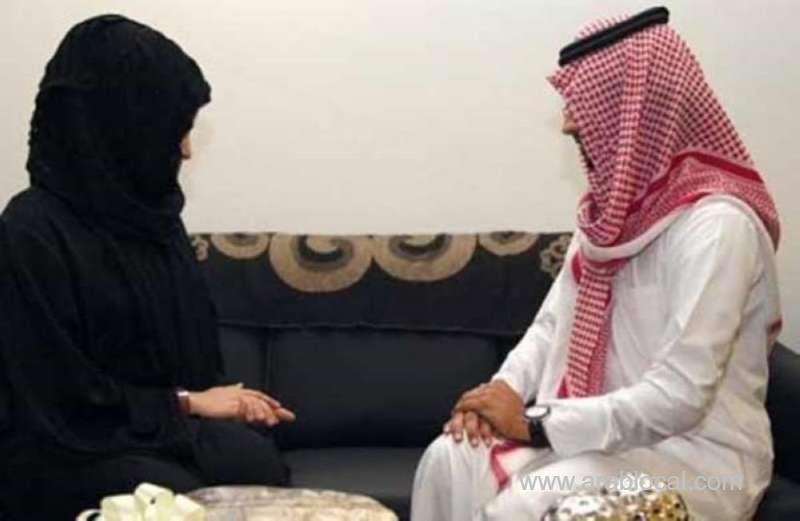SOME families have still been approaching courts to get the marriages annulled on the grounds of the incompatibility of tribal status of the couples or because of ongoing differences between their tribes. Saudi courts on a number of occasions in the past have ruled in favor of the families and declared such marriages void even when the couples in question wanted to continue in their relationship.
Early this month a couple who were forced to divorce over tribal incompatibility said they would take their case to the Supreme Court in an attempt to salvage their marriage. The Court of Appeals in Riyadh upheld a preliminary verdict issued by a lower court in Uyaynah in Riyadh province in October 2016 to forcibly separate Maha and Ali after the family members of the bride filed a lawsuit against the husband, accusing him of cheating regarding his ancestral origins.
Two days after the court ruling, Ali appeared along with his daughter in a video recording posted on social media websites asking the judicial authorities and human rights organizations to intervene in his case. Ali expressed his strong desire to be reunited with his now-divorced wife and put an end to his ordeal.
Maha also posted a video recording on social media expressing her fears that she may be forced to live in a social care house after the abrogation of her marriage by appeals court. Some legal experts are of the view that country's Supreme Court should nullify all court verdicts that separated married couples on the grounds of incompatible tribal status if the couple still wanted to lead a family life together.
However, religious opinion is divided on the issue, making it a major topic of controversy and heated debate in the media, among Islamic scholars and courts. Opponents say marriage between people from incompatible tribal status will cause psychological problems such as depression, anxiety and fear among the couple.
Many Islamic scholars have expressed their opposition to raising tribal incompatibility as a reason to separate married couples who want to live together. Ashraf Al-Shahri, a marriage officiator, insists that the talk of incompatibility of tribal status goes against the spirit of Islam. "The Shariah is meant to make things easy for people. It has not imposed anything beyond human ability and capacity,” he told Al-Watan Arabic daily.
“Discrimination based on one's descent, tribe or race is not permitted by the Shariah and there is no Qur’anic text that stresses the need for couple’s compatibility of status," he explained. In many cases couples are forced to nullify their marriage contracts against their will due to pressure from the family members and elders of the tribe.
"Courts issue verdicts nullifying such marriages citing the groom's family status is not befitting the bride's tribe or vice versa, but this is not permitted by Islam," Al-Shahri said. He sad there was nothing wrong if a man decided to marry a nice woman who belonged to a particular tribe as long as the couple wished to build a family together.
Referring to cases where the couples were separated through court verdicts, Al-Shahri said the judges might have had genuine reasons to separate the couples and rulings must have been issued to protect their own interests. Al-Shahri however said it was often the conceit of tribes that triggers such issues as they would not like to marry their daughters to men for other tribes that they deem to be of a low social status.
He said the status issues might create conflicts between tribes. “There are specified reasons for the nullification of a marriage, but the status of the tribe is not one of them,” Al-Shahri said. Psychiatrist Ali Al-Salem explained that such controversies would harm the welfare of families. He said forcible separation of a couple would lead one of them to suffer from psychological conditions such as depression and a loss of self-esteem.
“It will also lead a divorcee to develop hatred and vengeance toward her own family, which separated her from her husband by force,” Al-Salem told Al-Watan. The children of such women will also suffer from constant fear, apathy toward society, introversion and problems in their studies. Legal adviser Asim Al-Mulla said only a few tribal status cases reach personal status courts, because of the courts will not entertain most claims relating to the incompatibility of a couple's tribes.
However, Al-Mulla pointed out that some parents and guardians have approached courts and got marriages of their daughters with men belonging to tribes that are considered to be of a low status in society nullified. “There have been media reports of such cases. What is strange is that such verdicts are endorsed by the appeal courts,” Al-Mulla told Al-Watan.
He stressed the importance of Supreme Court’s intervention to overturn court rulings that discriminate between people on the basis of descent. He called upon the Supreme Court to issue an official statement clarifying that personal status courts will disqualify lawsuits by parents seeking to nullify marriages of their children on the basis of tribal incompatibility against the will of the couples.
A married couple can demand divorce if either of them denigrates the other in front of others, if there are physical flaws in either of them, if any of them are involved in a case of adultery, if the husband cannot meet the expenses of his wife and if one of them is adamant on getting a divorce.
In an infamous case that made headlines around the world in June 2005, a court annulled the marriage between Fatima Bint Suleiman and Mansour Al-Timan. The Supreme Court later overturned the decision. In 2003 Fatima and Mansour were happily married. The couple had two children, a daughter Nuha born in May 2004, and a son, Suleiman born in November 2005.
In just over a year after the marriage, following the passing away of Fatima’s father, her half-brothers filed a petition in the High Court of Al-Jouf asking the judge to divorce Fatima from Mansour on the grounds that he was of “inferior background.”
Fatima and Mansour were forced to divorce against their will, initially by the first instance court and reaffirmed after their appeal was rejected. When Fatima refused to separate from Mansour, she was confined to a protection home with her two children. However, the Supreme Judiciary Council overturned the controversial lower court ruling. After four years of separation, the couple and their children were finally reunited on Feb. 17, 2010.
Fatima thought her inheritance from her father might have been the reason behind the divorce petition. A number of similar cases in which marriage contracts were annulled by courts due to husband’s low lineage have been reported in the media. A couple were separated in 2007 on the basis of a court verdict but the General Court overturned that verdict allowing the couple to continue their married life.
Another case reported in Qatif in 2010 and it lasted for years, Al-Watan said. In 2017, another incompatible status case was taken to court in Qassim. In 2016 a woman in Jeddah was killed by her brother for marrying a man from a tribe with a lower status. In another controversial case, the appeals court in Riyadh separated a Saudi couple six years after their marriage, Al-Watan said.
SOURCE : SAUDIGAZETTE






